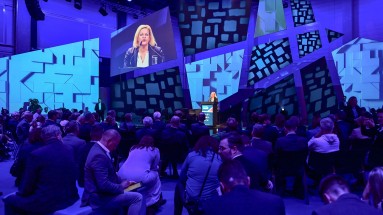Page content
“We must not become complacent”

The seventh Smart Country Convention (SCCON) opened with keynote speeches by Federal Minister of the Interior Nancy Faeser (SPD) and the President of Latvia, Edgars Rinkēvičs. A functioning democracy requires a community that is accessible to all citizens, said Faeser, who is the patron of SCCON. The digitalization of public administration serves the purpose of making people's lives easier and at the same time using new technologies such as AI for security in the country.
Leveraging potential for security in the country
The question is therefore “not whether, but how we change and how we shape change intelligently”, Faeser continued. She cited the decision on the EUDI wallet, the federal IPv-6 program and the OZG Amendment Act, which came into force in July, as examples. Among other things, the latter promotes the BUND ID and the once-only principle. At the same time, the security of people in the country is a top priority, emphasized the Minister of the Interior. It is therefore important to counteract cybercrime on the one hand and to utilize the potential of artificial intelligence on the other.
400 exhibitors, 600 speakers, seven program stages
The Smart Country Convention is the most important trade fair for the digitalization and networking of public administration in Germany. “We want to show what is important today and in the coming years,” emphasized Dr. Mario Tobias, CEO of Messe Berlin. And SCCON is becoming bigger and more international from year to year. This year, around 400 exhibitors from around a dozen countries will be presenting their products, services and examples of best practice. Around 600 speakers are expected on the more than seven program stages.
Latvia - quantum computing and one-stop agencies
The partner country for this year's event is Latvia, which is regarded as a pioneer of digital administration in Europe. In the Baltic state, 84 percent of internet users also make use of e-government services. 91 percent of public services are provided online. “Despite all this, we must not become complacent,” said President Edgars Rinkēvičs. Digital development is continuing. To remain competitive, it is important to drive forward artificial intelligence and quantum computing - and still not lose anyone on the digital path. In Latvia, there are therefore one-stop agencies as contact points.
The next step will be to establish a national AI center, Rinkēvičs announced on stage. On the one hand, Latvia needs to keep pace with technological developments, and on the other, security is a major issue - and that innovative technologies remain in the right hands.
Digitalization for more resilience in Germany
Dr. Ralf Wintergerst, President of the industry association Bitkom, warned that Germany, on the other hand, is in danger of running into a digital divide between society and the state or between companies and the state because the gap between the technical possibilities and implementation in the administration is widening. Eight out of ten companies see the lack of digitization in administration as a disadvantage for their location.
However, digitalization is also a question of the country's resilience. The following applies to both external attacks and civil protection: “We need to digitalize consistently so that we are prepared,” said Wintergerst. “There is nothing worse for security than half digitization”. This is why the Smart Country Convention is so important: it offers solutions and services that can be quickly implemented in administrations without having to reinvent the wheel every time.
Become an exhibitor at #SCCON25
As a driving force for the future of digital administration and for equal digital living and working conditions in cities and rural areas, the Smart Country Convention is a must for all stakeholders who actively advance the digital transformation. Are you interested in advancing the digitization of our cities and municipalities too? Join us and position your company or municipality as an expert in digitalization in the public sector.



